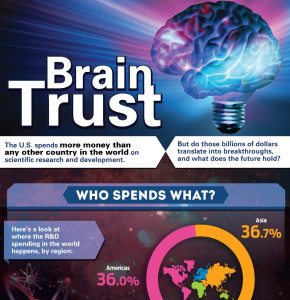Scientific Research and Development in the U.S. and Around the World
The U.S. spends more money than any other country in the world on scientific research and development.
But do those billions of dollars translate into breakthroughs, and what does the future hold?

Source: SuperScholar.org
The U.S. spends more money than any other country in the world on scientific research and development. But do those billions of dollars translate into breakthroughs, and what does the future hold?
Who Spends What?
Here’s a look at where the R&D spending in the world happens, by region:
Americas 36.0%
Asia 36.7%
Europe 24.1%
Rest of world 3.2%
The U.S. by far outspends every other country in the world on scientific research and development at more than $400 billion. But what about when that spending is compared to our total gross domestic product?
Country Total R&D spending (U.S. dollars)
United States $436 billion
China $198.9 billion
Japan $157.6 billion
Germany $90.6 billion
South Korea $56.4 billion
France $51.1 billion
United Kingdom $42.4 billion
India $41.3 billion
Brazil $30 billion
Canada $28.6 billion
Russia $26.9 billion
Italy $24.4 billion
Taiwan $22.3 billion
Australia $21.8 billion
Spain $20.4 billion
Sweden $14.4 billion
Netherlands $13.7 billion
Switzerland $10.4 billion
Israel $10.3 billion
Austria $9.9 billion
Turkey $9.7 billion
Singapore $8.8 billion
Belgium $8.6 billion
Finland $7.7 billion
Mexico $6.8 billion
Denmark $6.6 billion
Poland $5.7 billion
South Africa $5.5 billion
Norway $5.1 billion
Czech Republic $4.3 billion
Argentina $4.2 billion
Portugal $4.1 billion
Malaysia $3.3 billion
Ireland $3.2 billion
Hungary $2.4 billion
Indonesia $2.4 billion
Romania $1.8 billion
Saudi Arabia $1.8 billion
New Zealand $1.6 billion
Greece $1.6 billion
Country R&D spending as a percentage of GDP
Israel 4.20%
Finland 3.80%
Sweden 3.62%
Japan 3.48%
South Korea 3.45%
Denmark 3.08%
Switzerland 3.00%
Germany 2.87%
United States 2.85%
Austria 2.75%
Singapore 2.65%
Taiwan 2.38%
Australia 2.28%
France 2.24%
Belgium 2.03%
Canada 2.00%
Netherlands 1.90%
Norway 1.85%
United Kingdom 1.84%
Ireland 1.75%
Portugal 1.67%
China 1.60%
Czech Republic 1.55%
Spain 1.42%
Italy 1.32%
Brazil 1.25%
New Zealand 1.22%
Hungary 1.20%
Russia 1.08%
South Africa 0.95%
Turkey 0.90%
India 0.85%
Poland 0.72%
Malaysia 0.70%
Romania 0.66%
Argentina 0.61%
Greece 0.50%
Mexico 0.39%
Saudi Arabia 0.25%
Indonesia 0.20%
Where the Money Goes
Here’s a look at the areas where most of the research is focused, by country:
U.S.
National defense
Health
Space/flight research
China
Nanotechnology
Clean energy
Stem cell research
New labs and institutes
Japan
Energy conservation/new energy sources
Housing
Robot technology
Life sciences
Germany
Environment
Health
Physics
Aerospace/ transportation.
South Korea
Nanotechnology
Space
Bioscience/biomedicine
France
Renewable energy
Cancer
Communication technology
Space
United Kingdom
Engineering
Physical sciences
Medicine
Biotechnology
India
Agriculture
Biotechnology
Nanotechnology
Climate change
Canada
Aerospace
Information/communication technologies
Oil/gas extraction
Pharmaceutical/medicine manufacturing
Russia
Life sciences
Biopharmaceuticals
Nanotechnology
The Biggest Brains?
Which countries are poised for the biggest and best breakthroughs over the next decade?
Scientific and engineering researchers per capita
- Finland
- Sweden
- Japan
- Singapore
- Denmark
- Norway
- United States
- Australia
- Canada
- New Zealand
Patents per capita
- United States
- Japan
- Switzerland
- Finland
- Israel
- Sweden
- Germany
- Canada
- Denmark
- Hong Kong
Countries that will have the greatest scientific impact in 2020, according to Nature magazine readers
China 59%
United States 36%
India 29%
Germany 23%
Japan 22%
United Kingdom 19%
Brazil 16%
Australia 13%
Canada 11%
France 8%
Cause for Concern?
Budget cuts in the U.S. have led many scientists and researchers to sour on the U.S.
Nearly 1 in 5
American scientists considering pursuing their research overseas
67%
Scientists and researchers who say they’re getting less grant money than in 2010
More than 1 in 2
Researchers with colleagues who’ve lost a job or expect to soon
Bright Outlook?
While budget cuts may be hindering some research in the U.S. now, scientists around the world still consider the U.S. an attractive location to conduct their work.
To which countries would you consider relocating?
United States 56%
United Kingdom 55%
Canada 51%
Australia 46%
Germany 45%
France 37%
Japan 17%
Brazil 12%
India 9%
China 8%
Sources:
http://battelle.org
http://www.nsf.gov
http://www.npr.org
http://www.investopedia.com
http://cordis.europa.eu
http://www2.cnrs.fr
http://media.education.gouv.fr
http://oia.ncsu.edu
http://industrytoday.com
http://www.bioworld.com
http://martinprosperity.org
http://www.huffingtonpost.com
http://www.nature.com


